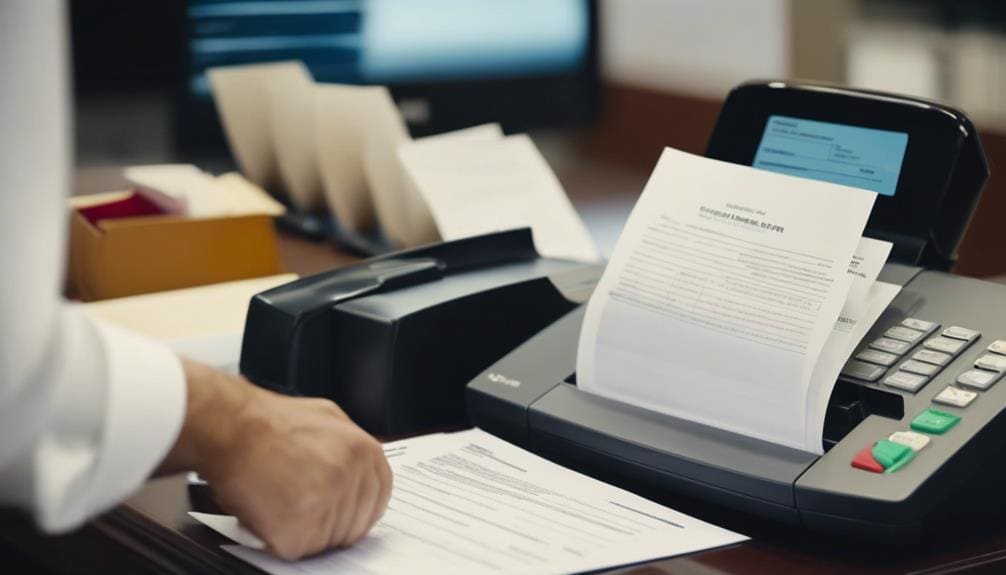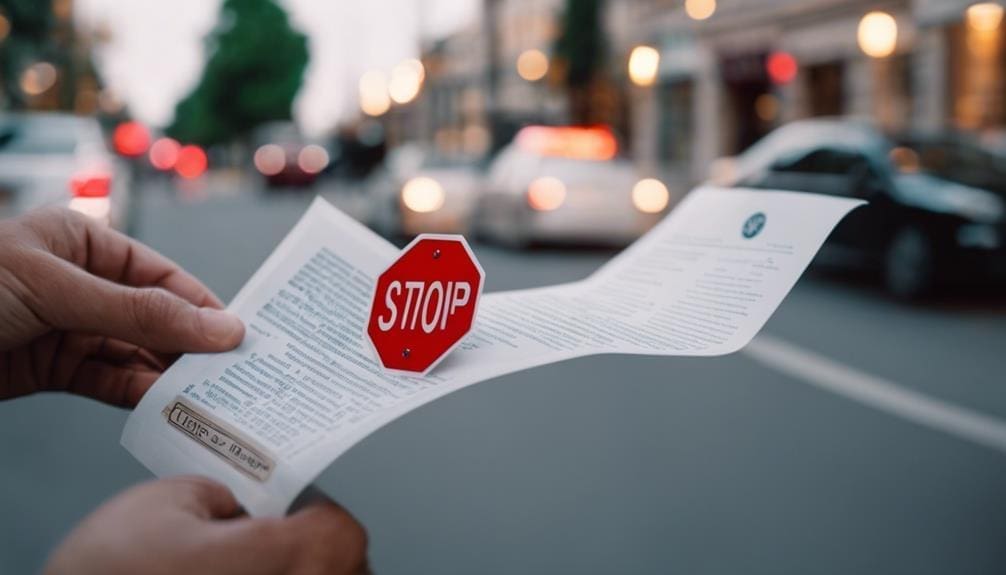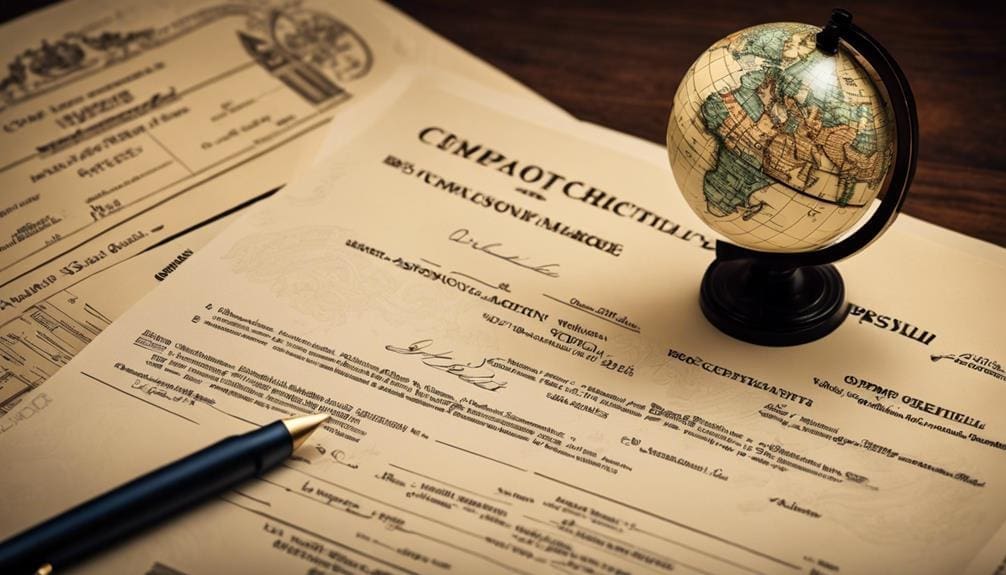If you are handling international document verification, understanding apostilles is essential. This specialized stamp, regulated by the Hague Convention, verifies your document's legitimacy globally. With essential details like the issuing state and a unique ID number, it's recognized by member countries. Apostilles authenticate public documents by simplifying the validation process. Whether for birth certificates or corporate papers, they guarantee acceptance across borders. Your global document validation process can be simplified with apostilles. Understanding their significance sets the stage for smooth international transactions.
What Is an Apostille Stamp?
When seeking to understand the concept of an apostille stamp, it is essential to recognize its critical role in verifying the authenticity of documents for international use. The apostille stamp, governed by the Hague Convention of 1961, serves as a standardized form of validation accepted by member countries. This certification streamlines the process of document legalization across borders, eliminating the need for further authentication. The apostille contains important information such as the issuing State, the name of the authority, date of issuance, and a unique identification number, which simplifies its recognition in foreign lands.
Without this apostille stamp, your documents may face rejection when presented to foreign authorities, potentially hindering international transactions or legal proceedings. Obtaining an apostille for your important paperwork is crucial for ensuring its validity and acceptance abroad. By adhering to the Hague Convention standards, you can confidently use your documents in various international settings without encountering unnecessary obstacles.
The Purpose of Apostilles
The purpose of apostilles is essential for authenticating public documents for international use. They streamline the validation process for a range of documents such as birth certificates and legal agreements. Apostilles eliminate the need for multiple levels of verification, simplifying cross-border document recognition.
Apostille Definition
Apostilles serve as official certifications that are attached to documents for international use, verifying the authenticity of the document and the signature of the issuing authority. These certifications simplify the process of validating documents across borders by providing a standardized method of verification. Established by The Hague Convention of 1961, apostilles play a crucial role in ensuring the legal recognition of documents in foreign countries. By confirming the genuineness of both the document and the signature, apostilles facilitate smoother international transactions, such as business agreements, academic exchanges, or legal proceedings. Understanding the definition and significance of apostilles is essential for anyone dealing with cross-border document authentication to ensure compliance with international requirements.
Legalization Process
To streamline the validation process for public documents issued internationally, a legal framework was established through the Apostille Convention. This framework aims to simplify document authentication by providing a standardized method for verifying the legitimacy of international documents. When it comes to the legalization process, understanding the role of apostilles is important. Here are five key points to help you grasp the significance of apostilles in document authentication:
- Apostilles simplify the authentication process for international documents.
- They eliminate the need for multiple levels of verification for documents like birth certificates and legal agreements.
- Apostilles reduce time and costs associated with cross-border document recognition.
- Competent Authorities in each country issue apostilles as standardized certificates certifying document authenticity.
- Apostilles ensure validity in all member countries of the Apostille Convention without further verification.
International Recognition
Efficiently streamlining the validation process for public documents internationally, apostilles play an important role in providing standardized recognition. When dealing with foreign authorities or institutions, having your public documents apostilled ensures they are accepted as authentic without the need for further legalization. Apostilles certify the origin of public documents such as birth certificates, marriage licenses, and legal agreements, making them valid in member countries of the Apostille Convention. This standardized validation process eliminates the complexities of multiple verifications, saving you time and costs associated with cross-border document recognition. Utilizing apostille services and completing the apostille form correctly are key steps in ensuring your documents receive international recognition efficiently and effectively.
Documents Eligible for Apostilles
When seeking an apostille, it's essential to determine if your document falls under the categories eligible for this certification. Certain documents like birth certificates and marriage licenses are prime candidates for apostilles, while others may require additional steps before being eligible. Understanding which document types are included and excluded will help you navigate the apostille process efficiently.
Required Document Types
Birth certificates, marriage licenses, and legal agreements are common document types that are eligible for apostilles. When seeking an apostille for international use, make sure the following documents are included:
- Educational diplomas, transcripts, and degrees
- Court documents and notarized affidavits
- Adoption papers
- Corporate documents such as articles of incorporation and business licenses
- Documents related to powers of attorney, wills, and trusts
These document types are essential for various purposes, from proving one's educational qualifications to establishing legal agreements or business operations in another country. Understanding the specific requirements for each document type will help expedite the apostille process and ensure your paperwork is in order for international transactions.
Excluded Document Categories
To guarantee you understand which document categories are excluded from receiving apostilles, it is essential to be aware of specific types that do not qualify for this certification. Administrative documents, private deeds, powers of attorney, and documents related to commercial or customs operations are typically ineligible for apostilles. Apostilles are not issued for documents executed by diplomatic or consular agents, administrative documents linked to commercial or customs operations, or those originating from administrative authorities dealing with public registries or private legal matters. Documents directly associated with the commercial or customs operations of a country fall under the excluded document categories and are generally not eligible for apostilles. It is important to verify the nature of your document to make sure it meets the requirements for apostille certification.
Contacting the Issuing Authority

Contact the designated Competent Authority in your country for guidance on how to obtain an apostille for your documents. It is important to reach out to the appropriate authority to make sure that your apostille process goes smoothly. Here are some key points to take into account when contacting the issuing authority:
- Identify the designated Competent Authority for apostille issuance in your country.
- Obtain detailed instructions and requirements for submitting documents for apostille authentication.
- Confirm that your documents meet the specific criteria set by the issuing authority to facilitate the apostille process.
- Contact the Foreign, Commonwealth & Development Office in the UK for guidance on obtaining an apostille.
- Conduct thorough research to confirm the correct authority responsible for apostille issuance to guarantee international recognition of your documents.
Document Preparation for Apostilles
When preparing documents for apostilles, make sure they are original and unaltered. It is important that the documents you submit for apostille certification have not been modified in any way. If your documents require notarization, verify they are notarized by a Washington state Notary Public before proceeding with the apostille process. This step is vital to authenticate the validity of your documents for use in foreign countries.
To initiate the apostille process, you will need to include a $15.00 fee per document payable to the Secretary of State for processing. Additionally, complete the Apostille Authentication Request Form accurately, providing correct contact and mailing information. If the documents you are submitting are for minors, remember to include the name of the adult making the apostille request on their behalf.
Submitting Documents and Fees

When submitting your documents for apostille authentication, make sure they are original unaltered certified copies or notarized personal documents. Remember to include the $15.00 fee per document payable to the Secretary of State in U.S. dollars. The submission process details will cover the required documents list, fee payment methods, and other essential information to successfully obtain your apostille.
Required Documents List
To submit your documents for apostille authentication, make sure you include original, unaltered certified copies of state or county-issued documents or personal documents notarized by a Washington state notary, along with a $15.00 fee per document payable to the Secretary of State in U.S. dollars.
- Confirm documents needing apostille are complete and unaltered.
- Verify documents are either state/county-issued or notarized by a Washington state Notary Public.
- Double-check the $15.00 fee per document is included and payable to the Secretary of State.
- Fill out the Apostille Authentication Request Form accurately, including country name and contact details.
- Remember to use the adult's name if the documents pertain to minors.
Fee Payment Methods
For efficient processing of your apostille request, payment methods typically accepted include checks or money orders, ensuring fees are payable to the designated authority, such as the Secretary of State. Submitting the correct fee amount is essential for the Department of State to process your apostille request promptly. Additionally, if you require expedited processing, some in-person services may offer this option for an additional fee. Payment instructions, including the acceptable payment methods and fee details, are outlined in the Apostille Authentication Request Form. Make sure to follow these instructions carefully to avoid any delays in the processing of your apostille request. Proper payment methods and fee submission are vital steps in obtaining your apostille efficiently.
Submission Process Details
Consider preparing your original unaltered certified documents and $15.00 in U.S. dollars payable to the Secretary of State for the submission process of apostilles. When submitting documents for apostille authentication, keep in mind the following details:
- Documents may require notarization by a Notary Public in Washington state.
- Along with the documents, submit the Apostille Authentication Request Form detailing country information and contact details.
- Each document submission incurs a fee of $15.00, payable in U.S. dollars to the Secretary of State.
- Expedited services are available for faster processing, with additional fees applicable.
- Different processing times exist for expedited services based on whether submissions are made in-person or through mail orders.
Processing Time for Apostilles

When processing apostilles for mail orders in Washington State, anticipate a timeframe of 2-3 business days. If you opt for expedited in-person services at the office in Olympia, you can have your apostille processed on the same day, provided you pay the additional fee. However, if you choose the non-expedited route, be prepared for a longer wait of 5-7 business days for the review and processing of your documents.
It is crucial to take into account the specific requirements of your documents, especially if they necessitate FBI Clearance letters, as these must be processed directly at the U.S. Department of State. Once your mail order for apostilles is complete, the documents will be returned to you using regular U.S. postal mail unless you include a pre-paid shipping label for a different carrier. Understanding these processing times and procedures ensures a smooth and timely apostille service experience.
Delivery Options for Apostilled Documents
To guarantee the timely delivery of your apostilled documents, it is important to understand the available options for receiving them securely. When dealing with apostilled documents, consider the following delivery options:
- In-person delivery: Opt for this if you need your documents urgently, but be aware that there may be an additional Same Day Service fee in Olympia.
- Mail services: Choose this option if time is not a critical factor. Expedited mail orders are typically reviewed within 2-3 business days, while non-expedited requests may take 5-7 business days.
- Regular U.S. postal mail: Apostilled documents are usually returned using regular U.S. postal mail unless you provide a pre-paid shipping label for a more secure and traceable delivery.
- Pre-paid shipping label: Consider using this option for added security and tracking of your important apostilled documents.
- Expedited service: If time is of the essence, consider opting for expedited service to guarantee a quicker delivery of your apostilled documents.
Limitations of Apostilles in the U.S

The limitations of Apostilles in the U.S. necessitate a clear understanding of their intended scope and applicability. Apostilles, governed by the Hague Convention Abolishing the Requirement of Legalisation for Foreign Public Documents, serve the purpose of validating documents for international use, not for domestic purposes within the U.S. It's important to recognize that Apostilles do not replace the need for other forms of legalization or certification required by U.S. authorities. The Hague Apostille Convention aims to simplify the process of authenticating documents across borders, making them valid in member countries that also adhere to the Convention. Hence, while an Apostille facilitates the acceptance of U.S. documents abroad, it is not a universal solution for all legalizations within the U.S. Understanding the Apostille's limitations ensures that you navigate the process of document authentication effectively within the framework of international standards set by the Hague Convention.
Additional Resources for Apostilles
For those seeking additional assistance with apostilles, exploring specialized resources can streamline the authentication process efficiently. Here are some helpful resources to aid you in obtaining an apostille:
- NNA Hotline: The NNA Hotline provides assistance and guidance on apostille-related queries.
- Notary News: Notary News offers updates and information on apostille requirements and processes.
- Comments Section: Engage with other users and share experiences with apostille procedures in the comments section.
- Washington State Services: Washington State offers expedited apostille services for an additional fee.
- FBI Clearance Letters: FBI Clearance letters for apostilles are processed exclusively at the U.S. Department of State.
These resources can be beneficial when dealing with the requirements and processes involved in getting an apostille attached. Remember to check with the office that issues apostilles or your country's embassy for specific guidance tailored to your situation.
Common Misconceptions About Apostilles

Misconceptions surrounding apostilles often arise due to a lack of understanding of their specific purpose and applicability. One common misconception is the belief that apostilles are required for documents used within the United States or its territories. However, this is not the case. Apostilles are not needed for domestic document authentication but are instead intended for international document recognition in Hague Convention member countries. The Hague Convention, through the Convention Abolishing the Requirement for Legalization for Foreign Public Documents, outlines the framework for apostilles to facilitate cross-border validity of documents. By grasping that apostilles serve a limited scope of validating documents internationally, one can dispel misunderstandings about their necessity for domestic use. It is important to recognize this distinction to make sure that apostilles are appropriately utilized for their intended purpose of authenticating documents for international legal purposes within the framework of the Hague Convention.
Frequently Asked Questions
Who Can Apostille a Document in the Usa?
You can apostille a document in the USA through authorized agents who handle federal documents exclusively. State-issued papers may need authentication instead. Processing times and costs vary based on the document's origin. It's important to adhere to the specific requirements for each type of document, ensuring a smooth apostille process. Make sure to take into account the necessary state execution for Hague Convention countries to complete the apostille successfully.
How Do I Apostille a Document?
To apostille a document, start by identifying the Competent Authority in your country. Confirm that the document is from a recognized authority. Submit paperwork and the original document or a certified copy. Fill out the Apostille Certificate form accurately. Pay the required fee by check or money order. The process includes these steps: overview, necessary documents, timing, and avoiding common mistakes. Keep in mind these key points to successfully apostille your document.
Can a Notary Do Apostille in Florida?
You can't get an apostille from a notary in Florida. Notaries handle notarization, not apostilles. Florida Department of State issues apostilles. Notaries can help notarize, but apostille is a separate process. Apostilles authenticate Florida Department of State officials' seals and signatures. They're crucial for international document validation. Notary qualifications don't cover apostilles; Florida requirements mandate the Department of State for this. Apostille process differs; legal implications are significant for international use.
Who Is the Competent Authority for Apostille in Usa?
When seeking an apostille in the USA, the competent authority is typically the Secretary of State's office. This office plays an important role in the authentication process of documents for international use. Each state has its own Secretary of State responsible for apostille issuance. Contacting the appropriate office is significant. Remember, the Competent Authority plays a key role in document authenticity and validity for foreign recognition, making them essential in the apostille process.

